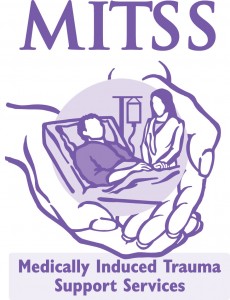Ten years ago this week, 11/18/99, Linda Kenney was scheduled for ankle replacement surgery. She woke up three days later in the ICU. Her chest had been cut open. She was in the hospital ten days.
And nobody talked about what had happened.
What had happened is that the nerve block administered to her ankle (a local anesthetic) had accidentally entered her blood. It quickly hit her heart, which was promptly anesthetized and stopped pumping.
She underwent emergency open heart surgery. She barely survived. And back then nobody involved had any clue how to deal with the truth.
The anesthesiologist who made the mistake, Dr. Rick Van Pelt, was in a similar bind. He wrote her a letter, without hospital permission. Months later they met, and started talking.
________________________________________________
 Friday night I was honored (and I mean that) to attend the annual dinner of MITSS, the inspiring non-profit they founded. MITSS is Medically Induced Trauma Support Services.
Friday night I was honored (and I mean that) to attend the annual dinner of MITSS, the inspiring non-profit they founded. MITSS is Medically Induced Trauma Support Services.
Today MITSS, a very small organization, provides much-needed support services to people who’ve been involved in medical errors – both patients and providers. We need to help their work spread around the world. Please tell your providers – before anyone you know needs the service.
Please watch this six minute video, now or later. More thoughts below.
Listening to the extraordinary words of Dr. Van Pelt in the video, and others at Thursday’s dinner, something sank in to me: these people cannot afford to make mistakes that I take for granted. And tears came to my eyes as I listened and realized:
There’s no “undo” for clinicians. They live with it.
I talk a lot about being a data geek. I can make Word (or a blog) act like a typesetting program, I hop around in Excel like crazy, I do unnatural acts with PowerPoint – Slideshare.net cannot render my slides properly. (Slideboom does.)
I try things constantly and I’m fearless about mistakes. Because I have Undo.
Clinicians don’t.
Thursday we heard about clinicians who’ve even quit the profession because they couldn’t live with the consequences of their error. That’s tragic.
Implications for participatory thinking
This movement shares something important with Participatory Medicine: both require getting past the idea that clinicians are, or should be, godlike – all-knowing and all-capable.
- Some in our culture (clinicians and patients alike) think clinicians know all and patients know not.
- Therefore, some think that clinicians who err should be fired, sued, or shot (it seems).
- And, in a classic denial dynamic, when the myth proves false, nobody wants to talk about it – so it can never improve.
Both seem predicated on a belief that clinicians are supposed to be perfect. Indeed, they’re required to be highly skilled and knowledgeable – but they’re still human.
As we shift to a more participatory view, I expect several good things to happen:
- Patients will take more responsibility (and even want it) for evaluating their options (shared decision-making, shared treatment plans) and for keeping an eye on things.
- Clinicians will learn to welcome this engagement (and even invite it). (At one of the policy meetings I attended in DC this June, the chairman (whom I’d never met) said “Boy do I wish my patients were like you.”)
- In the resulting dialog, patients will learn that their clinicians know they’re not perfect, and we’re in it together.
It can be done. My own primary, Dr. Danny Sands, known for being a physician leader, is not afraid to say “I don’t know – let’s find out” and show me how to hunt skillfully on the internet. There’s no shame in it.
One outcome of this thinking is that I’m suddenly very, very clear why Dr. Sands, my surgeon and my oncologist are sometimes quite thoughtful before they say something. They’re being careful.
And I admire that anew. The more I become a patient engaged in healthcare, the more I understand: these are humans attempting godlike tasks.
Please support MITSS and Participatory Medicine.
The time has come to end the era of physician as individual hero, with the world on his/her back. (Please read the wonderful thoughts from Paul Levy’s blog, copied into our January post Moving from “medicine as individual heroism” to “medicine as a team sport” .)
Linda says her organization’s goal is to put itself out of business by making these services part of every hospital. Help her lose her job: please spread the word.
MITSS Resources:
- Website: www.MITSS.org
- The MITSS YouTube channel including MITSS videos from the Institute for Healthcare Improvement
- MITSS Blogs – one for clinicians, one for patients/families
Participatory Medicine resources
- Society for Participatory Medicine
- Journal of Participatory Medicine – read, submit content, volunteer as a reviewer. We are at work building the body of knowledge that will end “physician as a god.” We are natural partners with the work of MITSS.
A personal note: as someone who’s trying to get something started here, I’m inspired and motivated by the wonderful things the very small MITSS starting team has created.






Bad News | How a Doctor Faces the Task of Giving Bad News (http://distractible.org/2009/11/17/bad-news/)